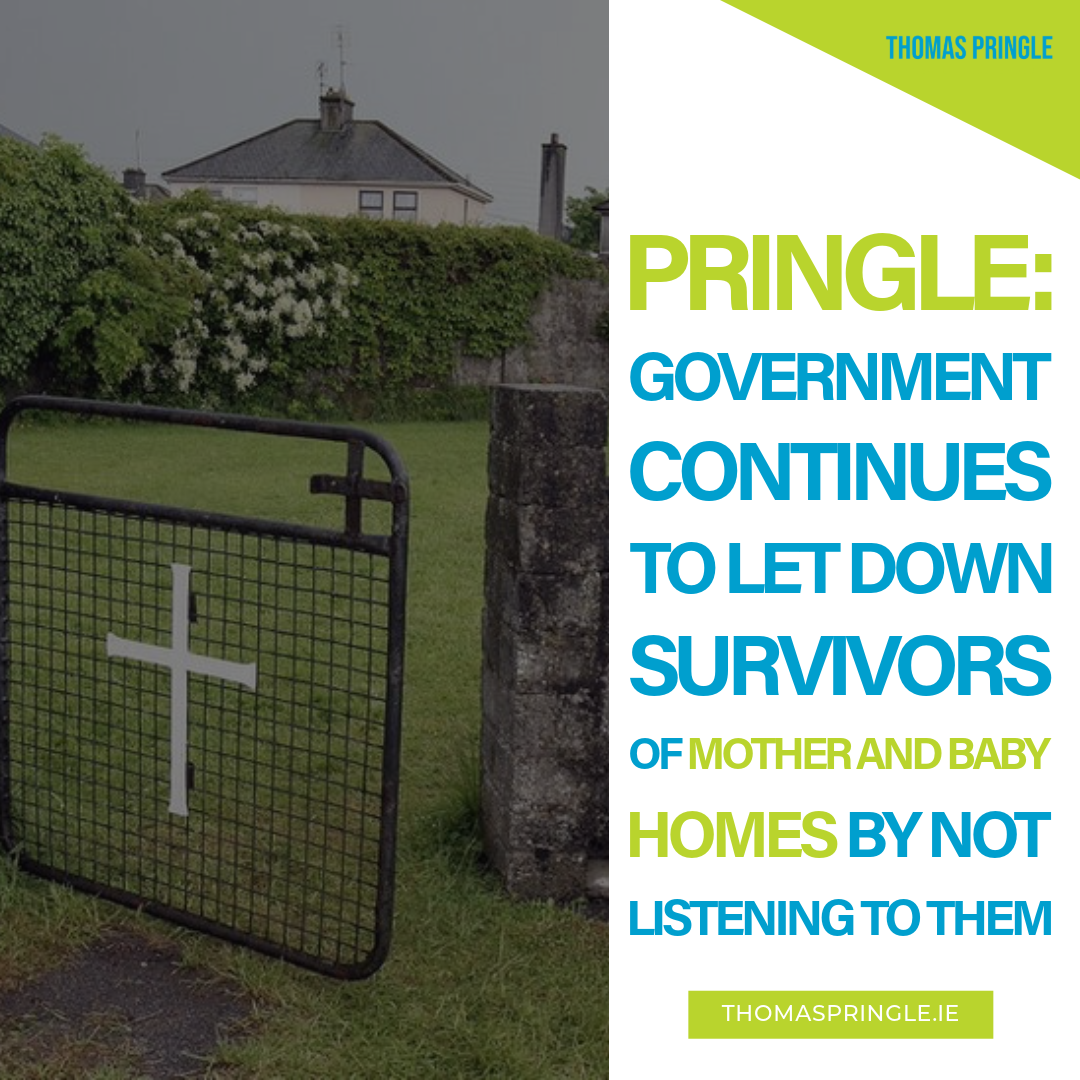- Pringle: We need a policy that recognises the importance of inshore fishing
- Pringle: Disabled people and carers face crisis of State neglect
- Pringle: Failed FF/FG housing policies forcing people to put their lives on hold
- Pringle welcomes Donegal council motion on Occupied Territories Bill: ‘We cannot stand by in the face of genocide’
Pringle: Government continues to let down survivors of Mother and Baby homes by not listening to them
- Updated: 2nd May 2024

Independent TD for Donegal, Thomas Pringle, said Government’s ongoing failure to listen to survivors of Mother and Baby Homes continues to let them down.
Addressing the Dáil today, Deputy Pringle said: “The State has repeatedly let down survivors of residential institutional abuse and this legislation unfortunately is yet another example of this.”
The deputy said: “The Mother and Baby Institutions Payment Scheme Act passed last year was also disgraceful and included cruel exclusions, such as the well-known minimum 180-day residency requirement to access payments and medical cards under the scheme. It was a perpetuation of past harms and is a retraumatisation for survivors, and this legislation is sadly not much better.”
The deputy was speaking on Supports for Survivors of Residential Institutional Abuse Bill 2024.
Deputy Pringle said: “The Mother and Baby Institutions payment scheme didn’t provide additional financial redress for those who experienced racial abuse, forced family separation and medical experimentation. It didn’t give an opportunity for formal recognition of survivor experiences. It didn’t oblige religious orders and those involved in running the Mother and Baby Homes to contribute financially to payments for survivors.
“In summary, it didn’t listen to survivors. And I think that’s the thing that’s key to all these processes, that there’s been no listening to survivors. Survivors have been able to talk but the State hasn’t taken on board anything that survivors have actually said in relation to it and that’s what’s wrong here across the board.
“We have a devastating history in this country of not listening to survivors of abuse or wrongdoing. We have seen examples of this time and time again,” he said.
Deputy Pringle said: “It is extremely cruel to force survivors to go through this consultation, to re-live their past traumas, to assess what is needed in their lives and to advise what will assist them in trying to move on and live their lives, for these requests to be completely ignored.”
He said: “A 2015 report commissioned by Caranua found that ‘the current living of survivors are highly disadvantaged when compared to the population as a whole’. The 2019 Consultation with Survivors Report outlined that a significant number of survivors are living in poverty and may have mental health problems and that some are socially isolated and homeless as well.
“This is absolutely disgraceful and should be a source of immense shame for this government and indeed for all citizens and all members of this House as well.”
The deputy said: “Human rights bodies, including the Irish Human Rights and Equality Commission, have outlined fundamental human rights principles that redress schemes should adhere to and this government has continuously failed to adhere to these principles.”
He said: “The principles also state that particular groups of victims should not be excluded in any way. Despite this, the government has continued to exclude victims. There are many victims that were excluded in last year’s legislation and there are many excluded in the legislation we are discussing today as well.”
The deputy called the Supports for Survivors of Residential Institutional Abuse Bill, “an extremely disappointing piece of legislation,” saying, “although, sadly, at this stage, this is not surprising. The legislation leaves out so much and leaves so many behind.” He said the bill also fails to give survivors access to an enhanced, HAA, medical card, which has been a priority concern for survivors for a long time.
Deputy Pringle said: “There should be no question of survivors’ entitlement to a contributory pension to recognise all the unpaid work they did in residential institutions and to give them the security to live out the rest of their lives without worry or financial stress. The fact that this has not been addressed in this bill or previous bills is outrageous.”
The deputy said: “The Department has said that the purpose of this bill is to provide health and education supports for survivors of residential abuse, but it should be said that the purpose of the bill was to provide health and education supports to some survivors of residential abuse. This legislation follows in the footsteps of previous legislation by excluding certain survivors. And I think that’s an absolute disgrace.”



